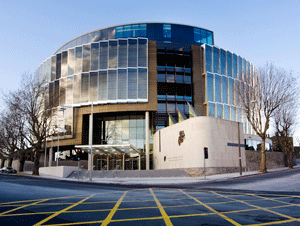High Court judge criticises ‘parallel justice system’ as murder trial collapses due to RTÉ programme

A High Court judge has criticised what she described as “a parallel justice system in the court of public opinion”, which is “gathering force” in Ireland and operates without “any regard to the courts at trial”.
Ms Justice Carmel Stewart made the remarks as a murder trial collapsed at the Central Criminal Court due to the content of Tuesday night’s Prime Time programme on RTÉ, which she said was likely to have influenced the deliberating jury.
The defence applied to discharge the jury following a 10-day trial due to a segment on the programme which “rubbished” the defence of provocation on which he was partially relying.
The jury had begun deliberating on Tuesday on whether the man, who stabbed a musician on either side of his neck, was guilty of murder or manslaughter.
Keith Brady, 31, was charged with murdering Martin ‘Matt’ Kivlehan, 59, on either 2 August or 3 August 2015. He had pleaded not guilty to murdering the man, but guilty to his manslaughter. It was a retrial, so the matter was already being considered by a jury for a second time.
Defence barrister Brendan Grehan SC had said that Mr Brady satisfied the defence of provocation because he had perceived that the deceased was touching his sister, Janice Brady. The judge had explained that provocation could reduce murder to manslaughter.
However, before the jury was brought into court, Mr Grehan raised a segment from Tuesday’s Prime Time programme with the judge.
He explained that, following a report on the recent Kerry murder trial, there was a discussion about the law of provocation between the presenter and a well-known senior counsel, lecturer, author and media commentator. The defence then played the segment for the court.
Mr Grehan said afterwards: “I’m not saying there can never be media, academic or legal discussion in relation to a defence or its merits. But we are, in this trial, at a particularly sensitive time where a jury is deliberating.”
The criticism of the defence of provocation and of the subjective test used in the defence may or may not be valid, he said, but what the viewer was left with was a suggestion that it was an ancient defence where somebody could make any allegation against the deceased who can’t rebut it and, in particular, an unwanted sexual advance - mirroring the facts of this particular case.
According to Mr Grehan, the segment suggested “the courts here are soft on the defence” and made reference to two of the most well-known Supreme Court judges in the country.
He complained about the suggestion, attributed in the piece to the late Mr Justice Adrian Hardiman, that the frailties of this defence could be mitigated by the person raising it having to get into the witness box to explain what they did and be open to cross-examination. Mr Grehan said that he couldn’t find this comment in any of Mr Justice Hardiman’s judgements.
He added: “It leaves the jury in the situation where they’ve heard directions from you but now may have been exposed to the view that judges of the Supreme Court don’t agree with the law in respect of this matter. The application I’m bound to make is one to have the jury discharged as there’s a real risk and danger that contamination may have taken place.”
Paul Murray SC, prosecuting, said he could not think of any case either where Mr Justice Hardiman had expressed the view about the accused getting into the witness box. However, he said that he was not too sure that it was absolutely and necessarily fatal to the case.
Both barristers agreed that, if none of the jury had seen it, that could be the end of the matter so long as the piece would be taken off the internet.
However, it emerged that five of the members of the jury had watched the segment and it had been discussed among them the next morning.
With great regret, Ms Justice Stewart said she was left with no option but to discharge the jury.
The judge commented that “some sort of parallel justice system in the court of public opinion” was “effectively gathering force” in this country “without any regard to the courts at trial”.
She added: “You have to sit through a criminal trial from beginning to end to get the full picture. In this day of instant communications and instant response, this parallel running commentary ongoing in both media and on other public platforms and social media comment is quite concerning.”
Noting that another trial in the Central Criminal Court had collapsed over the past fortnight due to such coverage, she said courts may have to return to sitting late at night and sequestering juries to a hotel, “if this type of running commentary continues where trials are ongoing”.
Mr Brady was remanded to 17 December, when a date will be set for his third trial.
Natasha Reid, Ireland International News Agency Ltd.




